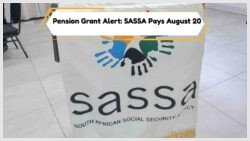NSFAS Grant Approval for August: Securing financial aid for higher education can be a daunting task, but the National Student Financial Aid Scheme (NSFAS) is a beacon of hope for many South African students. As the month of August approaches, students across the nation are eagerly awaiting the possibility of receiving their R5,200 NSFAS grant. This financial support is crucial for covering tuition fees, accommodation, and living expenses, enabling students to focus on their studies without the burden of financial stress. With the application process open, now is the time to ensure all your documents are in order and your application is submitted accurately to increase your chances of approval.
Understanding the NSFAS Application Process
The NSFAS application process is designed to assess the financial needs of students and allocate funds accordingly. To apply, students must first meet the eligibility criteria, which include being a South African citizen and enrolling in a public university or Technical and Vocational Education and Training (TVET) college. The application requires several documents, such as proof of income, identification documents, and academic records. It’s essential to gather all necessary paperwork before starting the application to avoid delays. Students can apply online through the NSFAS website, where they will need to create an account and complete the application form.
- Ensure you meet all eligibility criteria.
- Gather necessary documents: ID, proof of income, academic records.
- Visit the NSFAS website to create an account.
- Fill out the application form accurately.
- Submit the application before the deadline.
Key Dates and Deadlines for NSFAS Applications
Timing is critical when applying for the NSFAS grant. The application period typically opens in August and closes by the end of November. Missing these deadlines can result in missing out on crucial financial aid, impacting your educational journey. To stay on top of deadlines, students should regularly check the NSFAS website or subscribe to their notifications. It’s also advisable to start the application process early, allowing ample time to resolve any potential issues that may arise. The earlier you apply, the better your chances of receiving a timely response.
 Discover the Fastest Way to Unlock NSFAS Funds: Thousands Swear by This Proven Appeal Format!
Discover the Fastest Way to Unlock NSFAS Funds: Thousands Swear by This Proven Appeal Format!
| Event | Date | Action |
|---|---|---|
| Application Opens | August 1 | Start preparing your documents |
| Application Closes | November 30 | Ensure submission before this date |
| Feedback Period | December – January | Check your application status online |
| Payment Disbursement | February | Funds are released to successful applicants |
Benefits of Receiving the R5,200 NSFAS Grant
Receiving the R5,200 NSFAS grant can significantly alleviate the financial burden for students, allowing them to focus on their academic goals. This grant covers key expenses such as tuition fees, accommodation, study materials, and other essential living costs. Beyond financial support, NSFAS also provides career guidance and mentorship programs, empowering students to excel both academically and professionally. By easing financial stress, students can fully engage in their studies, participate in extracurricular activities, and develop skills that enhance their employability.
Supportive Services Offered by NSFAS
- Financial aid for tuition and living expenses
- Career guidance and mentorship programs
- Access to academic resources and support
- Opportunities for skills development and training
Additional Funding Opportunities
- Bursaries for specific fields of study
- Scholarships for high-achieving students
- Internships and work-study programs
Common Mistakes to Avoid During the NSFAS Application
While applying for the NSFAS grant, it’s crucial to avoid common pitfalls that can hinder your application. One of the most frequent mistakes is providing incorrect or incomplete information, which can lead to delays or rejection. Always double-check your application for accuracy, ensuring all sections are completed and documents are uploaded correctly. Another mistake is missing the application deadline, which can entirely disqualify you from receiving financial aid. Stay organised, set reminders, and regularly check for updates from NSFAS to stay informed about any changes or additional requirements.
Steps to Ensure a Successful Application
- Gather all required documents early.
- Double-check your application for accuracy.
- Submit before the deadline.
- Regularly check your email and the NSFAS portal for updates.
- Follow up if you encounter any issues or lack of feedback.
Detailed Analysis of NSFAS Grant Distribution
NSFAS Grant Allocation Trends
 August 17, 2025: R1,250 Foster Child Grant Payout Begins – Ensure You Receive Your SMS Alert!
August 17, 2025: R1,250 Foster Child Grant Payout Begins – Ensure You Receive Your SMS Alert!
| Year | Number of Applicants | Funds Allocated (in millions) |
|---|---|---|
| 2020 | 500,000 | R34,000 |
| 2021 | 600,000 | R39,000 |
| 2022 | 700,000 | R42,000 |
| 2023 | 750,000 | R45,000 |
| 2024 | 800,000 | R48,000 |
Future Prospects for NSFAS Funding
With the ever-growing demand for financial assistance, NSFAS is continually evolving to meet student needs. Looking ahead, the scheme aims to increase its budget to accommodate a larger number of applicants. This growth will not only ensure more students receive the necessary support but also improve the quality of education by alleviating financial barriers. As government policies and economic conditions change, students should stay informed about potential shifts in NSFAS funding to strategically plan their educational pursuits.
| Projected Year | Expected Applicants |
|---|---|
| 2025 | 850,000 |
| 2026 | 900,000 |
| 2027 | 950,000 |
| 2028 | 1,000,000 |
| 2029 | 1,050,000 |
| 2030 | 1,100,000 |
FAQs on NSFAS Grant Application
What are the eligibility criteria for NSFAS?
To be eligible, you must be a South African citizen, enrolled in a public university or TVET college, and demonstrate financial need. Academic performance is also considered.
How do I apply for the NSFAS grant?
Applications are submitted online through the NSFAS website. Ensure you have all required documents and complete the form accurately.
When are the NSFAS application deadlines?
The application period runs from August to November each year. It’s critical to submit before the deadline to be considered for funding.
What expenses does the NSFAS grant cover?
The grant covers tuition fees, accommodation, study materials, and essential living costs.
Can I appeal if my NSFAS application is rejected?
Yes, you can appeal a rejection by following the appeal process outlined on the NSFAS website, ensuring you provide additional supporting information.




